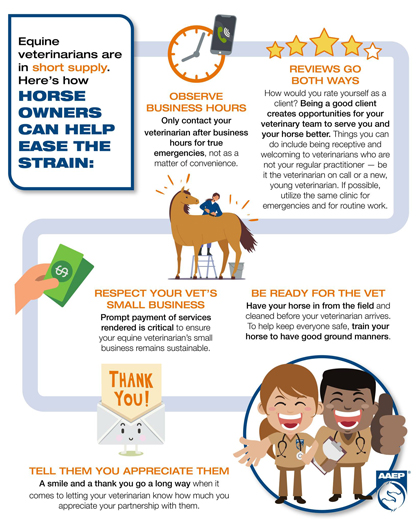AAEP Creates Commission to Alleviate Equine Veterinarian Shortage
The American Association of Equine Practitioners (AAEP) has formed the Commission on Equine Veterinary Sustainability to develop strategies to retain and recruit more veterinarians to equine practice.
Many areas of the United States and beyond currently face a shortage of equine practitioners to provide veterinary care to horses and other equids. This equine welfare issue will further intensify without action to address the diminishing number of equine veterinarians.
The Commission will be led by AAEP-member volunteers with work focused in five key areas: compensation, strategies for effective emergency coverage, veterinary practice culture, internships, and supporting the growth and development of the equine veterinary student.
“The equine veterinary profession is in crisis,” said AAEP President Dr. Emma Read. “In order to transform equine practice, we must address the pain points which are driving exceptional horse doctors away. Without change, future veterinary care for our nation’s horses will be greatly jeopardized.”
According to AAEP data, approximately 1.3% of new veterinary graduates enter equine practice directly each year, and another 4.5% pursue further training in equine internship positions. Within five years, however, 50% of all these veterinarians leave for small animal practice or quit veterinary medicine altogether. The primary reasons are burnout due to the personal demands of the profession and personal struggle due to the lower starting salaries for equine practice when compared to companion animal practice. Many new veterinarians begin their career with more than $200,000 in student loan debt.
While developing solutions to the five key factors affecting sustainability of equine practice, the Commission will ensure that the needs of one-and two-doctor practices are carefully considered. Approximately 50% of AAEP members operate practices of this size. Outreach to horse owners and equine industry partners will create expanded awareness and yield additional perspective.
“Every person in the profession has a role to play in its transformation,” added Dr. Read. “This is one of the largest initiatives ever undertaken by the AAEP and we look forward to collaborating with equine veterinarians and those who help support them in all facets of practice to change the numbers.”
About AAEP
The American Association of Equine Practitioners, headquartered in Lexington, Ky., was founded in 1954 as a non-profit organization dedicated to the health and welfare of the horse. Currently, AAEP reaches more than 5 million horse owners through its over 9,000 members worldwide and is actively involved in ethics issues, practice management, research and continuing education in the equine veterinary profession and horse industry.











